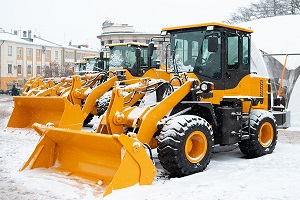
Is Your Construction Equipment Winter Ready? If you run a construction business, nothing gets done without your heavy equipment.Those pieces of machinery are your workhorses and keeping those machines operational is a full-time job.If you operate in a winter climate, that job is even tougher.
Frigid temperatures, ice, snow, wind, and salt can all take a heavy toll on machinery and equipment.But with some careful planning and diligent maintenance, you can keep things running smoothly all winter.Here are 10 tips to keep your construction equipment operating at maximum efficiency during the cold winter months.
Store equipment indoors.Whenever possible, store your heavy equipment and machinery out of the elements in an enclosed storage facility.Keep oils and fluids at room temperature.
Be especially diligent about properly storing diesel exhaust fluid (DEF), which freezes at prolonged exposure to temperatures of 12 degrees or lower.Install engine block heaters.A block heater will increase the temperature of the engine, oils, and hydraulic fluid, and it can be the simplest way to ensure an engine will fire up in cold weather.
To speed up the warming process, block off the radiator to restrict cold air from the fan.Keep batteries warm and fully charged.Your batteries have to work a lot harder in cold weather.
In fact, they have to pump out almost twice as many cranking amps to turn over a cold engine.Consider using battery warmers or storing batteries indoors when not in use, and keep batteries charged.Winterize with the right lubricants.
As cold weather approaches, winterize your equipment with the correct engine, hydraulic, transmission, and final drive lubricants for winter operations.Before starting the machinery, make sure all lubricants are filled to proper levels and are fluid enough for proper flow.Condition hydraulic hoses.
The outer wrapper of hydraulic hoses can sometimes crack when flexed in cold weather.To avoid cracking, apply an Arctic hydraulic oil for colder months.Normal operating of the machine will condition the hydraulic hose.
Properly inflate tires.Cold weather can cause tires to lose air more quickly.Tires should always be inflated in a heated area to help the tire bead seat more firmly.
Check all tire pressures at the beginning of every shift.Be vigilant with daily inspections.Winter can be brutal on equipment, so be diligent about inspecting all equipment daily before operating.
Look for cracks, cuts, and wear on hydraulic hoses, belts, and tires.Remove any snow, dirt, and debris from the equipment.Check filters, batteries, fluids, tires, lights, wipers, and the heater and defroster.
Run engines up to operating temperature.Before putting your equipment to work on a cold winter day, it’s important to run the engine until it reaches operating temperature.Among other things, it will keep the intake and exhaust valves from sticking.
You should also test out all of the machine’s functions to help the oil and fluids get distributed properly.Clean and fill at the end of the day.Clean any snow, ice, dirt, and debris from machinery at the end of the day, and always fill the fuel tank at the end of each shift to avoid a frozen fuel tank in the morning.
Protect stored machines.If you have a piece of equipment that will be unused and stored for the winter, protect the engine cylinders with a protective spray to fight corrosion and rust.That will help prevent damaged cylinder seals, which could mean a disastrous oil leak when you fire up the machine in the spring.
By taking appropriate measures before and during the cold winter months, you can keep your workhorses running smoothly and avoid costly breakdowns.Want more risk management advice for your construction company? Contact the construction insurance professionals at BNC Agency.
Publisher: Normal for Business








